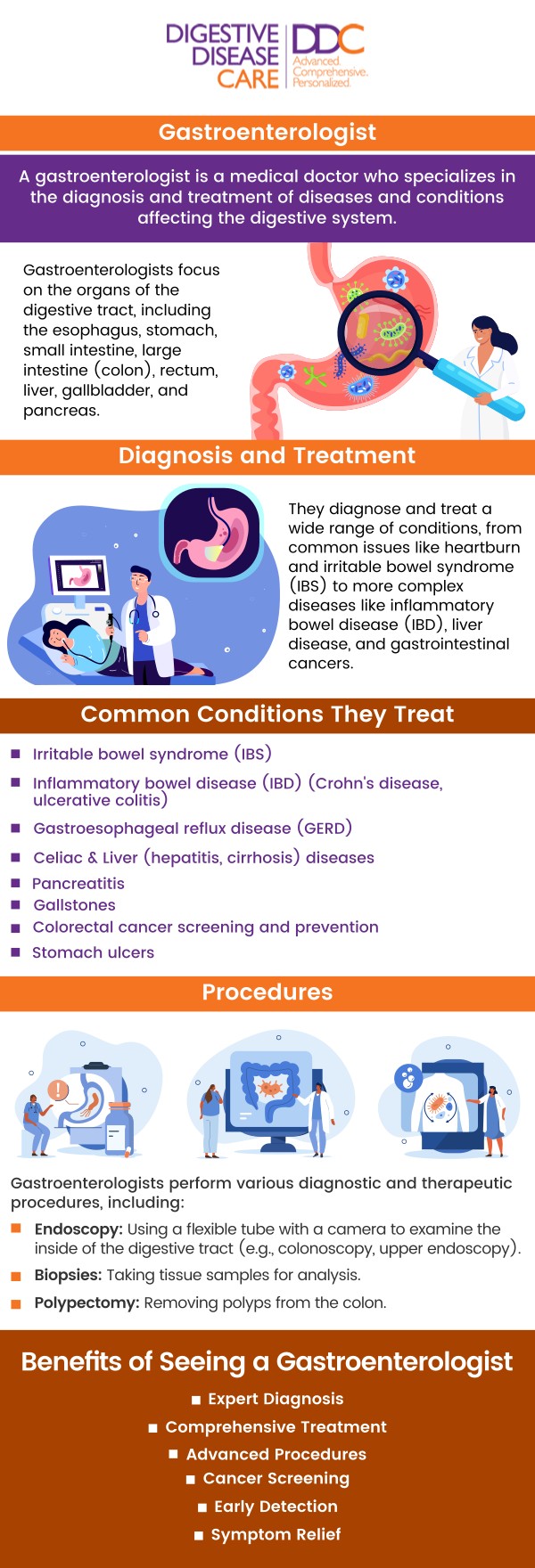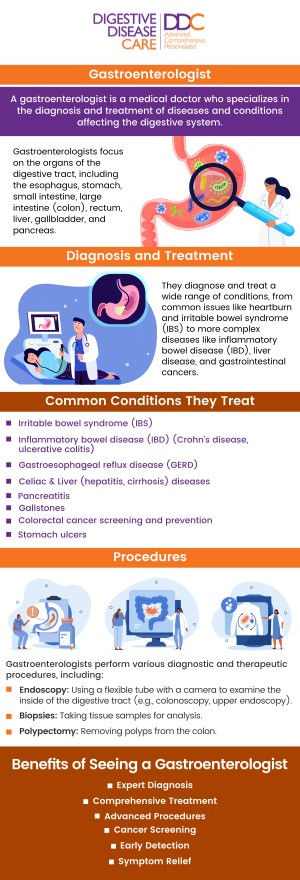Reputable Board-Certified Gastroenterologist in Setauket, NY
At Digestive Disease Care (DDC) in Setauket, NY, we are home to a team of reputable, board-certified gastroenterologists dedicated to your digestive health. Our specialists offer comprehensive care tailored to your individual needs, ensuring you receive expert treatment in a warm and welcoming environment. Whether you require advanced diagnostics or routine screenings, DDC is committed to providing the highest standard of care to help you achieve and maintain optimal digestive wellness. Contact us today to get trusted care or book an appointment. We are conveniently located at 235 N Belle Mead Rd, Setauket- East Setauket, NY 11733.




Table of Contents:
What can I anticipate during my initial visit to a gastroenterologist in Setauket, NY?
How can I determine if I need a referral to see a gastroenterologist in Setauket, NY?
What common digestive issues do gastroenterologists in Setauket, NY treat?
What should I bring to my appointment with a gastroenterologist in Setauket, NY?
The process commences with a discussion about your medical history and the symptoms you are currently experiencing. Our board-certified gastroenterologists will ask about any previous diagnoses, surgeries, treatments, and medications you are on. They may also inquire about your lifestyle, particularly your eating and exercise habits, as these can greatly influence your digestive health.
Subsequently, a physical examination will take place. This could involve abdominal palpation, auscultation, checking for bloating, tenderness, or unusual sounds, and a rectal exam to check for any abnormalities. Other parts of your body may also be examined for signs of digestive problems, such as yellowing of the eyes that could signal liver disease.
Depending on your symptoms and the gastroenterologist’s evaluation, you may also need to undergo diagnostic tests. These tests can vary from blood tests, stool tests, urine tests, and imaging studies, to more invasive procedures like endoscopies or colonoscopies. These procedures allow our doctors to visualize and assess the inside of your digestive tract. The type of tests ordered will largely depend on your initial findings.
After reviewing your medical history, physical exam, and diagnostic test results, our gastroenterologist will discuss their findings with you. They will explain any potential diagnoses, recommend further tests or procedures if necessary, and provide treatment options. Depending on your condition, treatment could involve medication, dietary modifications, lifestyle changes, or even surgery in more serious cases.
To prepare for your visit, bring a list of your current medications and supplements, and wear comfortable clothing that allows easy access to your abdomen. If any imaging tests or endoscopic procedures are planned, fast for at least 12 hours beforehand. It’s also recommended to have a designated driver or other person accompany you for endoscopic procedures.
Understanding when you need a referral to see a gastroenterologist can be somewhat confusing. Several important indicators suggest it might be time to consult a specialist. Our team of gastroenterologists are medical specialists who diagnose and treat conditions that affect the digestive system and liver.
Persistent digestive issues that do not respond to general care and over-the-counter medications may warrant a referral to a gastroenterologist. This includes symptoms like chronic heartburn, acid reflux, persistent stomach pain, chronic diarrhea or constipation, and unexplained weight loss. Other symptoms may include difficulty swallowing, jaundice (yellowing of the skin or eyes), fatigue, and weakness.
Certain symptoms require urgent attention and should prompt an immediate referral. These include severe abdominal pain that doesn’t improve with home remedies, vomiting blood or black, tarry stools, fever accompanied by abdominal pain, and jaundice combined with dark urine or light-colored stools.
Other considerations for a referral can include having a family history of digestive disorders or having undergone previous abdominal surgeries. If you’re on medications that may impact your digestive system, or your symptoms are not responding to over-the-counter treatments, these could also be reasons to seek a referral.
If you’re over 50 and haven’t had a colonoscopy, it’s advisable to visit a gastroenterologist for this essential preventive screening. This is especially crucial if you have a family history of colon cancer or other digestive disorders.
Remember, whether a referral is required largely depends on your health insurance policy. Some insurance plans require a referral from a primary care physician before you can see a specialist, while others do not. If you’re unsure, check with your insurance provider.
Our team frequently encounters and successfully manages:
• Gastroesophageal Reflux Disease (GERD): Known for causing symptoms like heartburn, regurgitation, and chest pain. This condition occurs when stomach acid frequently flows back into the esophagus.
• Irritable Bowel Syndrome (IBS): This persistent disorder impacts the large intestine, causing symptoms such as abdominal pain, bloating, gas, and irregular bowel habits.
• Inflammatory Bowel Disease (IBD): This term refers to conditions like Crohn’s disease and ulcerative colitis, which cause long-lasting inflammation and sores in the digestive tract.
• Peptic Ulcers: Ulcers that form on the inner lining of your stomach and the upper part of your small intestine.
• Pancreatitis: Inflammation of the pancreas that can cause severe abdominal pain and, in chronic cases, permanent damage to the pancreas.
• Gallstones: Diagnose and treat these hardened deposits in the gallbladder.
• Liver-related issues: These include hepatitis, cirrhosis, and liver cancer.
• Celiac Disease: This autoimmune condition causes the body to react adversely to gluten, damaging the small intestine and leading to nutrient deficiencies, abdominal pain, and diarrhea.
• Diverticular Disease: This condition involves the formation and inflammation of small pouches (diverticula) in the colon walls, causing symptoms like abdominal pain, fever, and chills.
• Hemorrhoids: Swollen veins in the rectum or anus, which can lead to discomfort, itching, and bleeding.
Our gastroenterologists conduct colorectal cancer screenings and manage conditions like rectal bleeding and fecal incontinence. If you are experiencing persistent digestive problems, don’t hesitate to seek the high-quality medical attention available at Digestive Disease Care.
When preparing for your appointment at Digestive Disease Care, it’s crucial to come well-prepared to ensure a fruitful discussion about your digestive health. This involves bringing along several key items.
• Medical History and Records: A comprehensive medical history including details of allergies, surgeries, and diagnosed conditions is essential. If available, your family medical history can also be of great help as it might reveal genetic predispositions.
In addition, any recent lab or test results related to your gastrointestinal health such as blood tests, endoscopies, colonoscopies, or biopsies can provide valuable insights into your current condition. Our team of experts will utilize this data to help diagnose and treat your condition.
• Current Medications: We need to know what medications you are currently taking. This includes prescription drugs, over-the-counter pills, vitamins, and herbal supplements. The dosage and frequency are also vital information.
• Insurance Information: Please remember to bring your valid health insurance card and a photo ID to your appointment. Make sure you are aware of your deductible and co-pay amounts to avoid any financial surprises. Digestive Disease Care accepts a range of insurance plans for your convenience.
• Symptoms and Questions: Detailed information about your symptoms can greatly assist us. Consider writing down any symptoms you have experienced, including their frequency, duration, and severity. Also, bring along a list of questions or concerns you want to address during your appointment. This could range from queries about your diagnosis, treatment options, dietary advice, or lifestyle alterations that could help manage your condition.
By providing this information, you can help our gastroenterologists understand your condition better and formulate an effective treatment plan. We suggest arriving early for your appointment to ensure you have ample time to fill out any necessary paperwork or sign a medical record release form to allow our team to access your medical history from other providers. We have convenient locations to serve you in Melville NY, New Hyde Park NY, Forest Hills NY, Jericho NY, Mineola NY, Lake Success NY, Babylon NY, East Setauket NY, Massapequa NY, Riverhead NY and BEYOND.

Check Out Our 5 Star Reviews


Additional Services You May Like

Additional Services You May Like
- Abdominal Pain
- Acid Reflux
- Barretts Esophagus
- Bloating
- Capsule Endoscopy
- Celiac Disease
- Colon Cancer Screening
- Colonoscopy
- Constipation
- Crohns Disease
- Diarrhea
- Diverticulitis
- Esophageal PH Monitoring
- Fatty Liver
- Fibroscan
- Gallstones
- Gastroenterologist
- Gastric Chest Pain
- Gluten Intolerance
- Hemorrhoid
- Hemorrhoid Banding
- Hepatitis
- Irritable Bowel Syndrome
- Lactose Intolerance
- Pancreatitis
- Polyps
- Rectal Bleeding
- Stomach
- Ulcerative Colitis
- GI Urgent Care





